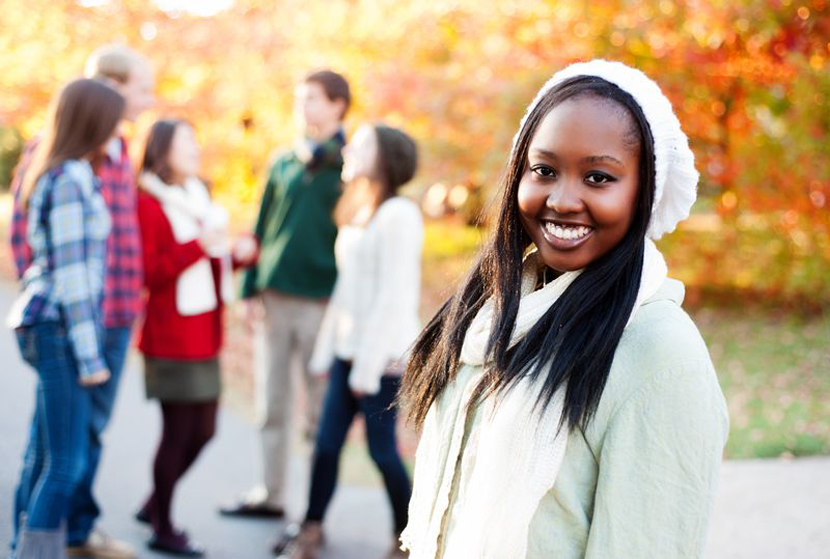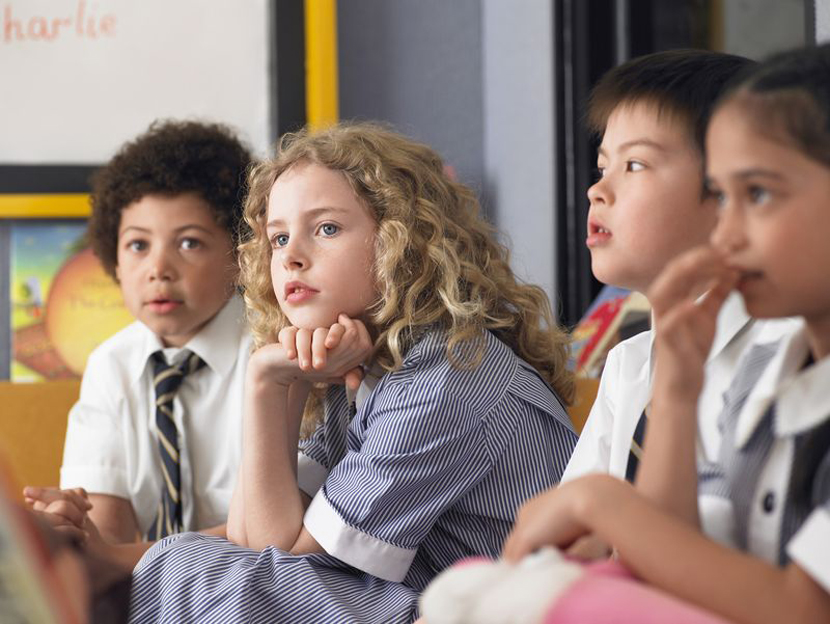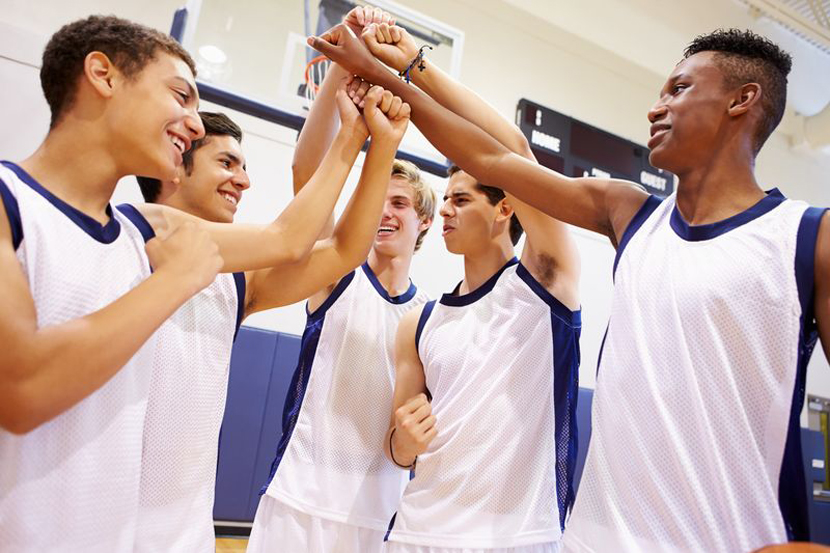By Jenée Desmond-Harris | Originally Published at Vox. March 4, 2015, 8:40 a.m. ET
You’ve probably heard it before: too many black students don’t do well in school because they think being smart means “acting white.”
It’s a popular thing to say, but it’s not true. At best, it’s a very creative interpretation of inadequate research and anecdotal evidence. At worst, it’s a messy attempt to transform the near-universal stigma attached to adolescent nerdiness into an indictment of black culture, while often ignoring the systemic inequality that contributes to the country’s racial achievement gap.
Where the acting white theory came from

(Shutterstock)
The acting white theory — the idea that African-American kids underachieve academically because they and their peers associate being smart with acting white, and because they’re afraid that they’ll be shunned — was born in the 1980s. John Ogbu, an anthropology professor at the University of California at Berkeley, introduced it in an ethnographic study of one Washington, DC, high school. He found what he dubbed an “oppositional culture” in which, he said, students saw academic achievement as “white.”
The acting white theory has since become a go-to explanation for the achievement gap between African-American students and their white peers, and repeated as if it’s a fact of life.
Authors such as Ron Christie in Acting White: The Curious History of a Racial Slur and Stuart Buck in Acting White: The Ironic Legacy of Desegregation have written entire books (heavy on personal observations, anecdotes, and theories) dedicated to the phenomenon.
Even President Barack Obama said in 2004, when he was running for US Senate, “Children can’t achieve unless we raise their expectations and turn off the television sets and eradicate the slander that says a black youth with a book is acting white.”
The 'Acting White' theory also validates a particular social conservative worldview
Perhaps aware of some of the research debunking this as an academic theory in the intervening years, he noted in 2014 remarks related to the My Brother’s Keeper program that it was “sometimes overstated.” But he still offered the theory in the form of a personal observation, saying that in his experience, “there’s an element of truth to it, where, OK, if boys are reading too much, then, well, why are you doing that? Or why are you speaking so properly?”
It’s no surprise that the “acting white” narrative resonates with a lot of people. After all, it echoes legitimate frustrations with a society that too often presents a narrow, stereotypical image of what it means to be black. It validates the experiences of African-American adults who remember being treated like they were different, or being smart but not popular in school. And for those who are sincerely interested in improving educational equality, it promises a quick fix. (“If they would just stop thinking being smart was ‘acting white,’ they could achieve anything!”)
The “acting white” theory also validates a particular social conservative worldview by placing the blame for disparate academic outcomes squarely on the backward ideas of black children and black cultural pathology, instead of on harder-to-tackle factors like socioeconomic inequality, implicit racial bias on the part of teachers, segregated and under-resourced schools, and the school discipline disparities that create what’s been called the school-to-prison pipeline.
The “acting white” research is weak

(Shutterstock)
“The acting white theory is difficult to assess through research,” Ivory Toldson — Howard University professor, senior research analyst for the Congressional Black Caucus Foundation, and deputy director of the White House Initiative on HBCUs — wrote in The Root in 2013. “Many scholars who claim to find evidence of this theory loosely interpret their data and exploit the expert gap to sell their finding,” he said.
There's no research that explicitly supports a relationship between race, beliefs about 'acting white,' social stigma, and academic outcomes
Despite abundant personal anecdotes by African-Americans who say they were good students in school and were accused of acting white, there’s no research that explicitly supports a relationship between race, beliefs about “acting white,” social stigma, and academic outcomes.
Even those who claim to have found evidence of the theory, Toldson explained, failed to connect the dots between what students deem “white” and the effect of this belief on academic achievement.
“Observing and/or recording African-American students labeling a high-achieving African-American student as acting white does not warrant a characterization of African-American academic underperformance as a response to the fear of acting white,” he said.
Studies suggest that the highest-achieving black students are more popular than the lowest-achieving ones

(Shutterstock)
A prime example of a shaky study on this topic, according to Toldson, was Roland G. Fryer’s 2006 research paper “Acting White: The Social Price Paid by the Best and the Brightest Minority Students.” Published by Education Next, the Harvard economist purported to affirm Ogbu’s findings by using Add Health data to demonstrate that the highest-achieving black students in the schools he studied had few friends. “My analysis confirms that acting white is a vexing reality within a subset of American schools,” Fryer wrote.
But the numbers didn’t actually add up to support the “acting white” theory, Toldson said. To start, the most popular black students in his study were the ones with 3.5 GPAs, and students with 4.0s had about as many friends as those with 3.0s. The least popular students? Those with less than a 2.5 GPA.
It seemed that the “social price” paid by the lowest-achieving black students was actually far greater than the price in popularity paid by the highest academic achievers.
The 'social price' paid by the lowest-achieving black students was actually far greater
Fryer himself said that there was “no evidence of a trade-off between popularity and achievement” for black students at private schools, poking another hole in the theory.
Plus, Toldson pointed out, even if the results had shown that the highest-achieving students at all schools had the fewest friends, that would have indicated a connection between grades and popularity, but wouldn’t have supported the core of the ‘acting white’ theory itself. “Methodologically, the study has to make the ostensible leap that the number of friends a black student has is a direct measure and a consequence of acting white,” he explained.
That’s probably why in 2011, Smith College’s Tina Wildhagen, in the Journal of Negro Education, tested the “entire causal process tested by the ‘acting white’ theory,” using the Educational Longitudinal Study of 2002 and found, “the results lend no support to the process predicted by the acting white hypothesis for African-American students.”
Research suggests that black students have more positive attitudes about education than white students

(Shutterstock)
There is an established phenomenon called the attitude-achievement paradox, which refers to the way positive attitudes about school can fail to translate to successful academic outcomes among black students. Originated by Roslyn Mickelson in 1990, it’s been the subject of extensive sociological research.
For example, in a study published in the American Sociological Review in 1998, James Ainsworth-Darnell and Douglas Downey, using data from the National Educational Longitudinal Study, found that black students offered more optimistic responses than their white counterparts to questions about the following: (1) the kind of occupation they expected to have at age 30, (2) the importance of education to success, (3) whether they felt that teachers treated them well, (4) whether the teachers were good, (4) whether it was ok to break rules, (5) whether it was ok to cheat, (6) whether other students viewed them as a “good student” (6) whether other students viewed them as a “troublemaker,” and (7) whether they tried as hard as they could in class.
Findings like these fly in the face of the idea that black students think academic achievement is “white” or negative, or that it’s something they must actively shun for acceptance and popularity.
Findings like these fly in the face of the idea that black students think academic achievement is 'white' and or negative
When Toldson analyzed raw data from a 2005 CBS News monthly poll of 1,000 high school students, who were asked their opinions on being smart and other smart students, he saw this reflected again.
Students were asked, “Thinking about the kids who get good grades in your school, which one of these best describes how you see them: 1) cool, 2) normal, 3) weird, 4) boring, or 5) admired?” The responses of black males, black females, white males and white females were around the same. But black males were the most likely (17 percent) to consider such students “cool.”
Students also answered this question: “In general, if you really did well in school, is that something you would be proud of and tell all your friends about, or something you would be embarrassed about and keep to yourself?” Eighty-nine percent of all students said they would be “proud and tell all.” Black females were top among this group, with 95 percent saying they’d be proud. Meanwhile, white males, at 17 percent, were the most likely to say they would be “embarrassed or keep to self” or report that they “did not know” how they would handle the news that they were doing very well academically.
As recently as 2009, researchers have revisited the theory and confirmed the findings of pro-school attitudes among black students.
All racial groups have nerds

(Shutterstock)
Fryer’s research found that the very highest-achieving black kids were the least popular — but this likely had much less to do with beliefs about acting white and more to do with the fact that the very smartest kids of any race tend to suffer social stigma.
“In my own research, I have noticed a ‘nerd bend’ among all races, whereby high — but not the highest — achievers receive the most social rewards,” Toldson said. “For instance, the lowest achievers get bullied the most, and bullying continues to decrease as grades increase; however, when grades go from good to great, bullying starts to increase again slightly. Thus, the highest achievers get bullied more than high achievers, but significantly less than the lowest achievers.”
In a 2003 study titled “It’s not a black thing: Understanding the Burden of Acting White and Other Dilemmas of High Achievement,” published in the American Sociological Review, researchers concluded that the smartest black and white students actually had similar experiences and that the stigma was similar across cultures:
Typically, high-achieving students, regardless of race, are to some degree stigmatized as “nerds” or “geeks.” School structures, rather than culture, may help explain when this stigma becomes racialized, producing a burden of acting white for black adolescents, and when it becomes class-based, producing a burden of “acting high and mighty” for low-income whites.
So very high-achieving kids of all races experience social isolation at times. This is why there are plenty of high-achieving black kids to provide anecdotes about being socially shunned (and there are probably plenty of white kids who could do the same, but there isn’t the same appetite for collecting these stories to explain the white experience). And there are also plenty of black kids — many of whom are also smart — who have been accused of “acting white.” But there doesn’t appear to be much of a basis to connect the two experiences.
Jamelle Bouie gave his take on the distinction between these two experiences in a 2010 piece for the American Prospect, writing,
As a nerdy black kid who was accused of ‘acting white’ on a fairly regular basis, I feel confident saying that the charge had everything to do with cultural capital, and little to do with academics. If you dressed like other black kids, had the same interests as other black kids, and lived in the same neighborhoods as the other black kids, then you were accepted into the tribe. If you didn’t, you weren’t. In my experience, the “acting white” charge was reserved for black kids, academically successful or otherwise, who didn’t fit in with the main crowd. In other words, this wasn’t some unique black pathology against academic achievement; it was your standard bullying and exclusion, but with a racial tinge.
Why it matters that we get this right

(Shutterstock)
The “acting white” theory is tempting to believe because it does contain pieces of truth: Yes, there’s a racial academic achievement gap. Yes, there are plenty of African-American adults eager to tell stories about how they were shunned because they dared to be different. And yes, some super high-achieving black kids — like kids of all races — suffer social stigma. These individual facts are each painful, and they each resonate with people in a way that makes it easy to blur what’s missing from the “acting white” equation: an actual, causal connection between the accusations of acting white, social stigma, and lower academic outcomes. There isn’t one.
It’s particularly troubling that this myth persists, because stories about the sources of educational inequality can shape public attitudes and policy. A continued willingness to believe that solutions lie in simply repairing backward attitudes about getting good grades will continue to distract from the real problems: poverty, segregation, discipline disparities, teacher biases, and other structural factors. Unfortunately, none of these issues is as easy to fix as simply changing the beliefs of black students.
Jenée Desmond-Harris is a Journalist covering race, law, and politics for @Voxdotcom. | Follow Jenée Desmond-Harris @jdesmondharris or through jenee.desmondharris@voxmedia.com
This piece was reprinted by EmpathyEducates with permission or license. We thank the Author, Jenée Desmond-Harris for her kindness, observations, research, and for inviting us to have, what we believe is a crucial conversation. We also wish to extend our gratitude to Vox.












Leave A Comment